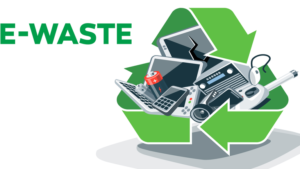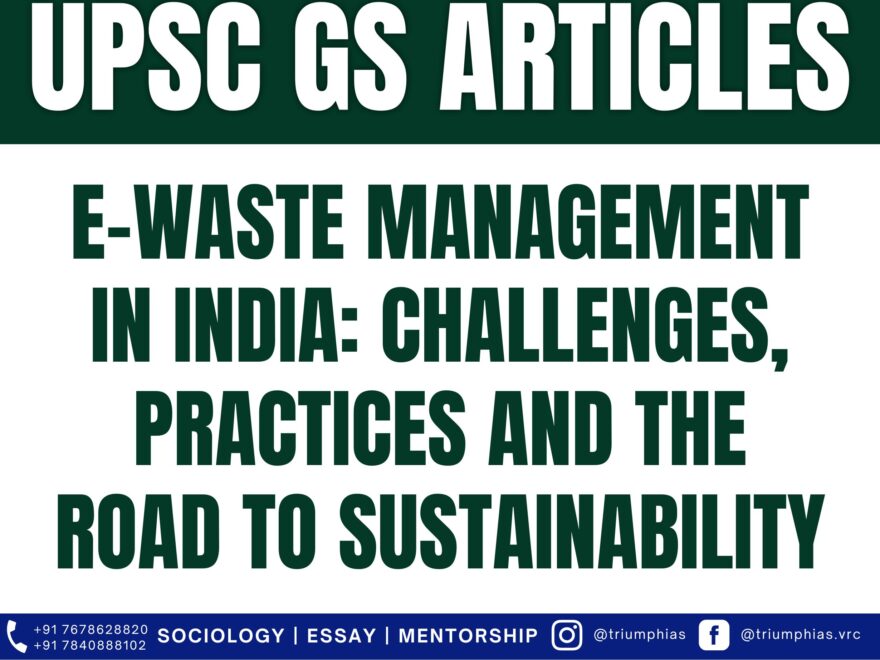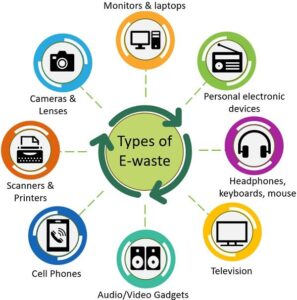E-waste
(Relevant for General Studies Paper Prelims/Mains)

India is now planning a shift to two standard chargers across mobile phone brands and portable-electronic devices which in turn will help in tackling the issue of e-waste.
- According to a report by ASSOCHAM-EY on electronic waste management, India is estimated to have produced five million tonnes of e-waste in 2021, placing it behind only China and the USA in terms of e-waste generation.
- The transition towards standardized chargers will not only simplify the consumer experience but also contribute to a significant reduction in the substantial amount of e-waste generated within the country. Many developed economies have already begun adopting universal charging devices.
- In an effort to establish a uniform charging standard, the European Union (EU) has mandated the use of the USB-C port across all devices by mid-2024, including Apple’s iPhone, which currently utilizes its proprietary charging interface.
- With this new regulation, consumers within the European Union will no longer need to acquire different chargers and cables each time they purchase a new mobile phone. Additionally, the requirement for manufacturers to provide chargers with new devices is expected to be eliminated, as users will already possess the necessary accessories.
E-WASTE
E-Waste, an abbreviation for Electronic Waste, refers to outdated, discarded, or end-of-life electronic devices along with their components, consumables, parts, and spares.
In India, laws have been established since 2011 to regulate the management of e-waste, requiring that only authorized dismantlers and recyclers handle e-waste. The E-Waste (Management) Rules of 2016 were enacted in 2017 to strengthen these regulations.
To address the proper handling of e-waste from households and commercial establishments, India has established its first e-waste clinic in Bhopal, Madhya Pradesh. This clinic serves as a facility for the segregation, processing, and disposal of electronic waste.
Challenges Related to the Management of E-Waste in India
- One of the main reasons why used electronic devices are not often recycled is because consumers themselves do not take the initiative to do so.
- In India, it has been observed that around 450,000 child laborers between the ages of 10 and 14 are involved in various activities related to e-waste, without adequate protection and safety measures, in yards and recycling workshops.
- E-waste consists of more than 1,000 toxic substances, which can contaminate the soil and groundwater.
- There is a significant flow of waste equipment across borders into India, with approximately 80% of e-waste from developed countries intended for recycling being sent to developing countries like India, China, Ghana, and Nigeria.
- Computers that reach the end of their life often contain sensitive personal information and bank account details, which, if not properly deleted, can create opportunities for fraud.
E-waste Recycling Practices in India
- In India, the majority of e-waste, around 95%, is recycled in the non-formal sector, while only 5% is handled by formal recycling units.
- Non-formal units typically engage in activities such as collecting e-waste from rag pickers and disassembling the products to salvage usable parts, components, and modules that have resale value.
- The remaining materials are subjected to chemical treatment in order to recover precious metals. However, the lack of proper resources and methods in these units can lead to the leaching of hazardous substances into the air, soil, and water.
Several start-ups and companies in India have recently initiated the collection and recycling of electronic waste. However, there is a need for improved implementation strategies and inclusive policies that support and acknowledge the contribution of the informal sector. This will enable them to play a significant role in helping us achieve our recycling targets while ensuring environmental sustainability.
Furthermore, to effectively increase the collection rates, the participation of all stakeholders, including consumers, is crucial.
To master these intricacies and fare well in the Sociology Optional Syllabus, aspiring sociologists might benefit from guidance by the Best Sociology Optional Teacher and participation in the Best Sociology Optional Coaching. These avenues provide comprehensive assistance, ensuring a solid understanding of sociology’s diverse methodologies and techniques.
E-Waste, India, Standard Chargers, Electronic Waste Management, Recycling, Electronic Devices, Regulations, E-Waste Clinic, Informal Sector, Environmental Sustainability, Child Labor, Cross-border E-Waste, Consumer Participation, Data Security, Best Sociology Optional Teacher, Best Sociology Optional Coaching, Sociology Optional Syllabus.
Follow us :
🔎 https://www.instagram.com/triumphias
🔎https://www.youtube.com/c/TriumphIAS
https://t.me/VikashRanjanSociology
Find More Blogs
|
Scope of the subject and comparison with other social sciences |
|||
|
|
|
|
Modernity and social changes in Europe |


